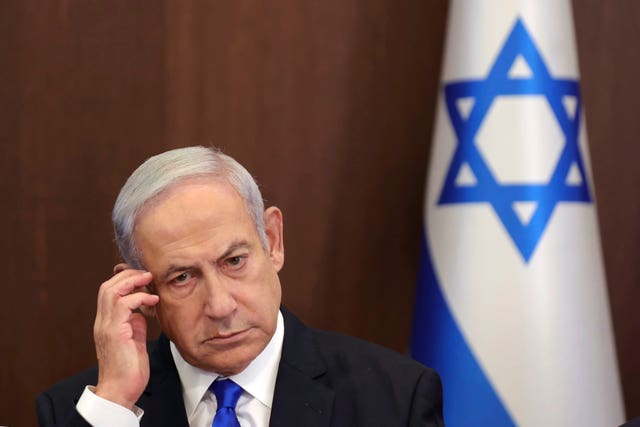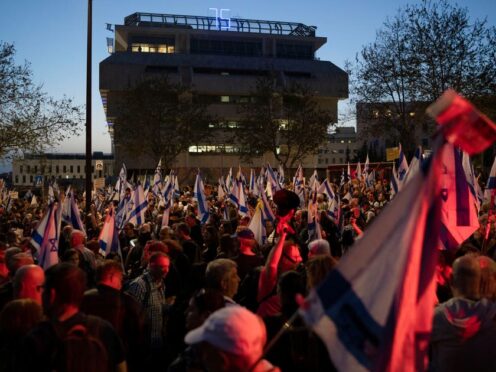Tens of thousands of Israelis have thronged central Jerusalem in the largest anti-government protest since the country went to war in October.
Protesters urged the government to reach a ceasefire deal to free dozens of hostages held in Gaza by Hamas militants and to hold early elections.
Israeli society was broadly united immediately after October 7, when Hamas killed some 1,200 people during a cross-border attack and took 250 others hostage.
Nearly six months of conflict have renewed divisions over the leadership of Prime Minister Benjamin Netanyahu, though the country remains largely in favour of the war.
Mr Netanyahu has vowed to destroy Hamas and bring all the hostages home yet those goals have been elusive. While Hamas has suffered heavy losses, it remains intact.
Roughly half the hostages in Gaza were released during a week-long ceasefire in November but attempts by international mediators to bring home the remaining hostages have failed. Talks resumed on Sunday with no signs that a breakthrough was imminent.
Hostages’ families believe time is running out, and they are getting more vocal about their displeasure with Mr Netanyahu.
“We believe that no hostages will come back with this government because they’re busy putting sticks in the wheels of negotiations for the hostages,” said Boaz Atzili, whose cousin, Aviv Atzili and his wife, Liat, were kidnapped on October 7.
Mr Liat was released but Aviv was killed, and his body is in Gaza. “Netanyahu is only working in his private interests,” he said.
Protesters blame Mr Netanyahu for the failures of October 7 and say the deep political divisions over his attempted judicial overhaul last year weakened Israel ahead of the attack.

Some accuse him of damaging relations with the United States, Israel’s most important ally.
Mr Netanyahu is also facing a litany of corruption charges which are slowly making their way through the courts, and critics say his decisions appear to be focused on political survival over the national interest.
Opinion polls show Mr Netanyahu and his coalition trailing far behind their rivals if elections were held today.
Unless his governing coalition falls apart sooner, Mr Netanyahu will not face elections until spring 2026.
Many families of hostages had refrained from publicly denouncing Mr Netanyahu to avoid antagonising the leadership and making the hostages’ plight a political issue. But as their anger grows, some now want to change course — and they played a major role in Sunday’s anti-government protest.
The crowd on Sunday stretched for blocks around the Knesset, or parliament building, and organisers vowed to continue the demonstration for several days.
They urged the government to hold new elections nearly two years ahead of schedule. Thousands also demonstrated pn Sunday in Tel Aviv, where there was a large protest the night before.
Mr Netanyahu, in a nationally televised speech before undergoing hernia surgery later on Sunday, said he understood families’ pain.

However, he said calling new elections — in what he described as a moment before victory — would paralyse Israel for six to eight months and stall the hostage talks. For now, Mr Netanyahu’s governing coalition appears to remain firmly intact.
Some hostage families agree that now is not the time for elections.
“I don’t think that changing the prime minister now is what will advance and help my son to come home,” Sheli Shem Tov, whose son Omer was kidnapped from a music festival, told Israel’s Channel 12. “To go to elections now will just push to the side the most burning issue, which is to return the hostages home.”
In his Sunday address, Mr Netanyahu also repeated his vow for a military ground offensive in Rafah, the southern Gaza city where more than half of territory’s population of 2.3 million now shelters after fleeing fighting elsewhere.
“There is no victory without going into Rafah,” he said, adding that US pressure would not deter him. Israel’s military says Hamas battalions remain there.
